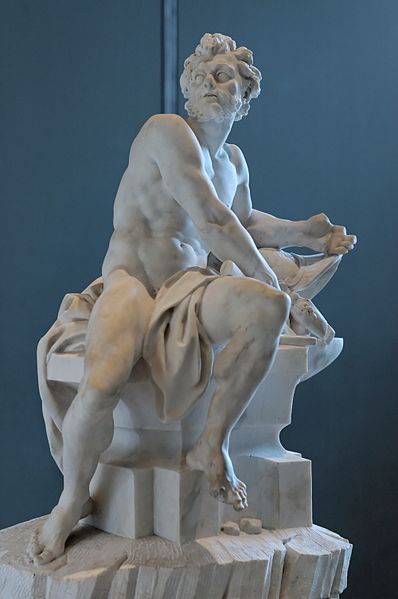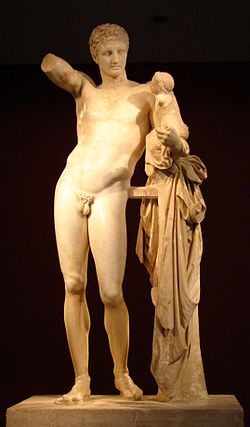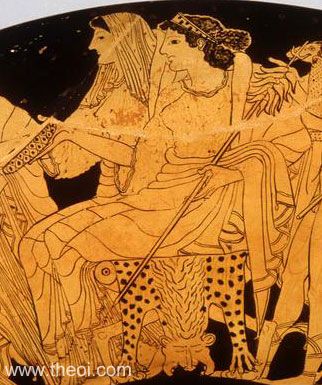Apollo: Bringing the Best in Everybody

The worship of Apollo is the most widely diffused. His birth was adventurous as his mother, Leto, was chased by the serpent Python (Hera's intrigue); he grew up miraculously fast (in seven months he assumed the appearance of a grown man); he avenged his mother's tortures (killed the Python) and learned the art of prophecy from the goat-legged god Pan; he killed Tityos for trying to violate his mother Leto and Marsyas for showing hybris. He never married, but he fathered many children. Not always a successful pursuer of women (he lost the nymph he loved more than anyone, Daphne), he fell in love with a young prince of Sparta, Hyacinthos, making him the first god to express homosexual tendencies. When his son Asclepios, the physician, tried to resurrect a dead man and was killed by Zeus for his hybris, he learned a great lesson in modesty and humility.
He was an old god, more ancient than the Iliad, where he appeared as god of the Trojans (Sminthian Apollo) and particularly unfriendly to Achilles. He was both the god of the Doric race-Apollo Carneios-and of the Ionic-Apollo Patroos. He was the protector and guide of the people sent to colonize new lands and supporter of the amphiktyonic spirit, as he provided sanctity to their meetings. His attributes included his prophetic powers, music, medicine and the sun. Numerous temples and oracles testify to his popularity.
Ares: The god of war

He was envisioned as a war veteran with outstanding military skills and physical strength. The sister and companion of Ares is Eris, the goddess of discord. He had two children with Aphrodite goddess of beauty: Deimos and Phobos. Deimos stands for, terror and Phobos stands for fear. They are both his faithful companions in battle. Ares is also accompanied by Kydoimos, the evil spirit of battle, the Makhai (battles), the "Hysminai" (manslaughters) and Polemos.
Artemis: The goddess of hunt and wilderness

Artemis is special among the other goddesses of Olympus. She was the daughter of Zeus and Leto and twin sister to Apollo. Leto gave birth to her in secret on the island of Delos to avoid the wrath of ever jealous Hera. She was the goddess of earth’s fertility and childbirth and was considered an excellent hunter rivaled by none. Artemis is the protector of the animals and guardian of all elements of nature, the rivers the lakes and the fields. She would run and hunt on the mountains and forests of Laconia escorted by the nymphs. Healing was also one of her powers, because she was known to help the sick cure themselves.
During the battle between Apollo and the pythons of Delphi as well as the fight against the children of Niobe she stood by his side. Her close relationship with Apollo was notable, but he was the god of the sun and the light, and she was the goddess of the moon also called Selene. She never married and remained virgin, never falling in love with any god or man. Her virtue was sought after, and many gods desired her and claimed her for themselves. Those who approached Artemis with lust or merely saw her naked were punished severely.
Artemis was worshiped in Athens and the rest of Greece. In art she is depicted young thin and elegant with a quick walking pace holding her bow and arrow.
Athena: Goddess of wisdom

Athena was the daughter of Zeus and Metis, the Titan and goddess of cunningness and wisdom. According to the myth Zeus received a prophecy that one of his off springs would bring the end to his reign. Zeus to avoid the future of his father swallowed Metis when she was pregnant with Athena. Athena continued to grow inside Zeus until later he complained of headaches and asked Hephaestus to relieve him of his pain. He used a double-headed Minoan Axe to split open his head.
As soon as Hephaestus hit Zeus’s forehead, Athena sprung out with a cry of war, fully armed dancing and wielding a Thunderbolt and the Aegis. Athena became the patron goddess of wisdom, strategy, warfare, civilization, female arts, crafts and weaving. Athena appears in Greek mythology as the helper and mentor of many heroes, including Odysseus, Jason, and Heracles. She is the only Goddess who does not marry nor consorts with any lover, mortal or immortal.
Atlas: No god carried a greater burden

Atlas was a Titan, the son of Iapetus and Asia. He was well-known to everyone because his task was no less than to support the sky and the heavens over the earth. According to the myth at some point in Titanomachy Atlas sided with the Titans against the Olympians while his other brothers Prometheus and Epimetheus betrayed the Titans and made an alliance with the Olympians in fear of losing.
When the Titans were lastly defeated, most of them were imprisoned in Tartarus, but Zeus had a different punishment in store for Atlas. His punishment was to hold the sky over the earth forever preventing them from ever contacting. He hence became known as the “enduring Atlas” embodiment of the celestial axis around which the heavens revolve.
Atlas once had a chance to break away from his burden when Hercules offered to hold up the sky in his stead while he left to fetch him some golden apples from the garden of the Hesperides. Heracles suspected Atlas would not be willing to return to his duty that easily and decided to trick him. He asked him to carry the sky again for just a while in order to rearrange his cloak as padding on his shoulders. When Atlas set down the apples and carried the heavens upon his shoulders again, Heracles took the apples and ran away.
Demeter: The goddess of agriculture

Demeter was the daughter of Chronus and Rhea. She was the goddess of agriculture and taught men how to seed and harvest the fields. This is why she was also considered a patron of family. She had many children with many consorts but the most notable was Persephone, her daughter with Zeus. The most notable myth about Demeter revolves around to her love for Persephone.
According to the myth Hades had great desire for Persephone. Giving-in to his lust he abducted her and brought her with him in the underworld to be his wife. Once Demeter realized that her daughter had been missing, she went looking for her. She aimlessly wondered on earth for nine days full of sadness and despair until she reached Eleysina. Taking the form of an old woman she approached King Keleos, who welcomed her as a guest not knowing who she was.
During her stay there she was assigned the upbringing of the king’s son Demophon. Fond of the young prince Demeter fed him ambrosia in order to grant him immortality. However when Demeter started to burn his body to complete his transition to godhood, Metaneira his mother started screaming not knowing who the old woman really was. Demeter offended stopped the process and Demophon remained a mortal. She however taught them the craft of agriculture in return for their hospitality.
In the mean time her anxiety resulted in all land to become barren and no seed would grow on earth. Zeus ordered Demeter to restore fertility on earth. In exchange he demanded Hades to allow Persephone to return back to Demeter nine months every year and keep her in the underworld the remaining three years. Hades accepted the offer the earth blossomed again. This is also the beginning of the four seasons.
Hades: The ruler of the underworld

Hades with Cerberus (Heraklion Archaeological Museum)
Hades is the oldest male child of Chronus and Rhea. According to myth, he and his brothers Zeus and Poseidon defeated the Titans and claimed authority over the cosmos, ruling the underworld the air and the sea respectively. Formidable in battle, he proved his fierceness in the Titanomachy, the battle of the Olympian gods against the Titans. Because of his association with the underworld, Hades spent most of his in his dark realm away from mount Olympus. Greeks considered the realm of Hades to be the final destination of the dead. A misty and dark place there was no escape from for any mortal who set foot upon it. Very few mortals managed to escape the boundaries of the underworld, like the celebrated heroes Hercules and Theseus.
Hades personified the inevitable finality of death which is why he was loathed by all mortals. He was not nevertheless a wicked god, since although he was strict and unpitying; he was still fair and just in his judgment. Although he was feared by mortals as the master of the underworld, he was not the personification of death himself. The actual incarnation of Death was Thanatos.
Hades consort and queen of the underworld was Persephone, daughter of Zeus and Demeter. He abducted her and claimed her as his wife, fact that caused great sorrow and despair to her mother. By ruling of Zeus he had hence agreed to let her return to her mother on mount Olympus for nine months every year.
Hephaestus: The craftiest of Gods

Hephaestus is the son of Zeus and Hera, the King and Queen of the Gods. He was the god of craftsmen, metallurgy, technology, fire and volcanoes. Although he was one of the twelve Olympian gods, Hephaestus was not held in as high esteem as the other gods were. He was pictured grotesque, a plain blacksmith holding an axe. His genius in craftsmanship however was acknowledged by all. He was the blacksmith of the gods and worshiped by men.
During a fight between Zeus and Hera, Hephaestus came to Hera’s rescue. Zeus in his fury flung him off of mount Olympus. Hephaestus fell for a day until he finally landed in the island of Lemnos where he was rescued and cared for. He was taught the art of craftsmanship by the Sintians. It is said that his fall was the cause of his ugly appearance. On the island of Lemnos, his companion was the sea nymph Cabeiro. He had two children with her who both became metalworking gods named the Cabeiri. Lemnos was considered to be the location of Hephaestus’s workshop.
Hephaestus was also the most unfaltering of the gods and the only god to return to Olympus after being exiled. He was Aphrodite’s companion but she, appalled by his unsightly look was hardly faithful to him. She was the goddess of beauty after all...
Most of the finely-shaped metalwork imbued with powers in Greek mythology is said to have been forged by Hephaestus. Notable examples are Hermes' sandals and helmet, Aphrodite's famed belt, Achilles' armor, Heracles' bronze clappers and Helios' chariot.
Hermes: The messenger god

Perhaps the Olympian god least present in Olympus, not because he was lesser but because he was the messenger god! When bidding had to be delivered Hermes with his winged sandals and helmet was the one to carry it. He was the son of Zeus and Maia, a nymph and one of the Pleiades, daughters of Atlas. She gave birth to him on the mountain Kiline in Arcadia and when found, the local king Abacus, raised Hermes as his foster son.
It is said he was so cunning that right after he was born he stole fifty cows belonging to God Apollo. Apollo was so furious that Hermes in order to calm him down created and offered him as a gift the first lyre, made from a turtle’s shell and 7 strings. This is how Hermes relation to music was established.
Hermes ranked lower in hierarchy than the other gods but he was most popular god, in the sense that he was closer to mankind than the others. He is the protector of shepherds, herds, and wonderers. This is why statues of him facing in each direction were placed on crossroads. He is also the considered a protector of commerce and profitability because of his cunningness.
As a messenger and crosser of boundaries, Hermes traveled to the underworld. Hermes was a psycho pomp, meaning he also carried newly-dead souls to the Underworld. It was also Hermes who brought Persephone safely back to Demeter from Hades. He is also known to be the bringer of daydreams to men.
Hestia: The goddess of every family

Shape: KylixPainter: Name vase of the Sosias Painter Date: ca 500 BC Period: Late Archaic
Hestia belongs to the first generation of Olympian gods along with her two sisters Demeter and Hera and her three Brothers Zeus Poseidon and Hades. She is the oldest of all the children of Chronus and Rhea, however she is referred to as the youngest sister because she was the first sibling to be devoured by Chronus upon her birth and the last to be yielded up again. Hestia is the goddess of the hearth, architecture, and of the right ordering of domesticity and family. This is why she is highly respected among men always receiving the first offering in all sacrificial ceremonies.
She is assumed to have a passive nature and not to confront any other gods in their heavenly feuds. Both Poseidon and Apollo desired her but she made a vow on Zeus head to never give-in to any god or mortal’s temptations. This is also illustrated in Greek mythology as there are almost no myths regarding her exploits. Hestia is not counted as one of the twelve Olympians because she later gave her place to newcomer Dionysus to bear her fire.
Poseidon: The god of the sea

Poseidon was the son of Chronus and Rhea, brother to Zeus, Hades, Hera, Hestia and Demeter. When Zeus overthrew his father Chronus and assumed power the siblings divided the world among themselves.
Poseidon became the ruler of the seas and all waters. Since water is essential to agriculture many of his myths are related to Demeter. Although older in age than Zeus he never claimed power and always respected his wishes.
He resides in a Golden Kingdom in the bottom of the ocean in the city of “Aiges”. The whereabouts of this city are unknown. Despite spending most of his time underwater Poseidon often ascended to mount Olympus to participate the summits of the Olympian Gods. His consort was Amphitrite with whom he had two children, Triton and Rhodos. He did however had many more children with other consorts, among them famous Theseus and the winged horses Pegasus and Arion.
He was the ruler of the sea but also the master of all natural phenomena related to it. He controlled storms and winds and with his trident could ignite explosions and earthquakes, sometimes even create islands. Poseidon was also the protector of fishermen, bringer of good wind and calm sea. Because of his children Pegasus and Arion, Poseidon was also attributed to be the patron of horses and horse-racing. His symbols are the Trident, Fish, Dolphin, Horse and Bull.
Tethys: Watch out for the northern star

Zeus-Hera: Zeus-An Insatiable Womaniser, Hera-Jealous but With Good Reason

According to the "Theogonic" order, Zeus came after Cronos and Ouranos, but in the poems of Hesiod and Homer as well as in the minds of the Greek people, Zeus occupied the predominant position. He was the greatest god, the one who maintained the supervision of all others. The patriarchal element of the Greek religion turned him into an insatiable womanizer so that he maintains total control of his environment and bears many children (perhaps this amorous side, with both goddesses and mortal, is supplied to him by the kings, thus ensuring a divine lineage to their genealogy). He rapes, thus referring to the destruction of the old religion by the new. When he lusted after Metis (Titan) he produced goddess Athena (who sprang out of her father's head after he had swallowed her mother out of fear that she would give birth to a patricide son.
He married Hera, his twin-sister, daughter of Cronos and Rhea; her name meaning "Protector" and being the pre-Hellenic "Great Goddess", she maintained some of her attributes such as the concept of fertility and rejuvenation through the annual renewal of her virginity in the waters of the spring Canathos. Her marriage to Zeus symbolized the end of the pre-Hellenic, matrilineal societies and their submission to the new patriarchal world. Their union produced Ares, Hephaestos and Hebe. Their marriage was marked by constant fighting and intrigues generated by Zeus' infidelity, as in the case of Leto, the mother of Artemis and Apollo (Hera sent the serpent Python to chase her not allowing her to deliver wherever the sun shone) or Semele, mother of Dionysus (whom she tricked into asking Zeus to appear before her in his true form - as thunder and lightning - thus consuming her).

mikael shadows god of vengeance mikaelshadows.blogspot.com
ΑπάντησηΔιαγραφή